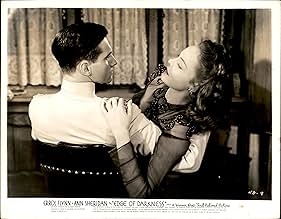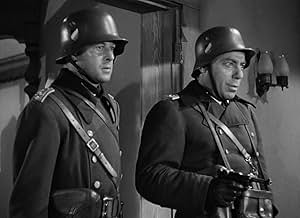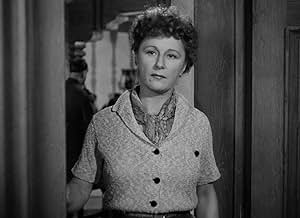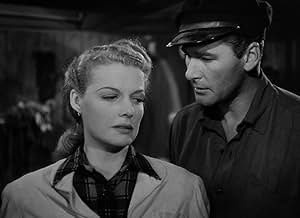Añade un argumento en tu idiomaAfter two years under German rule, a small Norwegian fishing village rises up and revolts against the occupying Nazis.After two years under German rule, a small Norwegian fishing village rises up and revolts against the occupying Nazis.After two years under German rule, a small Norwegian fishing village rises up and revolts against the occupying Nazis.
- Dirección
- Guión
- Reparto principal
- German Lieutenant
- (sin acreditar)
- Townsman
- (sin acreditar)
- Petersen
- (sin acreditar)
- Maj. Ruck
- (sin acreditar)
Reseñas destacadas
There was a popular sub-genre of war picture during the war years that centered on common European folk rising up against Nazi occupiers. This is one of the best that I've seen, although the propaganda nature of the storytelling keeps it from being truly great. Another minor weakness lies in Flynn's character, a rather bland cipher with little to distinguish him. Flynn apparently felt the same himself and tried to get out of the movie, but in the end it turned out to be a quality picture on his resume. Sheridan is good, if a bit too made up for a Norwegian villager in her situation. I also liked Nancy Coleman as a Polish gal at the end of her rope, and Judith Anderson as a rather severe woman whose secretly in love with one of the occupying soldiers. The movie's explosive climax seems light years away from director Milestone's work 13 years previously on what is arguably the greatest anti-war film, All Quiet On the Western Front.
However, this movie is a cut above other propaganda movies. The cast is excellent, top-notch all the way: Errol Flynn, Ann Sheridan, Walter Huston, Ruth Gordon, John Beal, Helmut Dantine, Judith Anderson and Morris Carnovsky.
Sometimes on the IMDb message board, a poster will ask for opinions on the best ensemble cast ever assembled. This one deserves a mention.
It's probably not at the top of everyone's list because it was released while Errol Flynn was fighting statutory rape charges, which was a distraction to audiences, certainly, and also because it followed "Casablanca."
Norway was dragged into the World War II conflict because Hitler was very concerned about protecting the Norwegian shoreline so that the Russians could not receive supplies if they joined the Allies.
In the story, the village is being occupied by the Nazis, who are taking the people's shipments of basic necessities and oppressing the entire town by their very presence - curfews, patrols, and the commandeering of the local hotel as their base.
Flynn plays the head of the resistance, a brave fisherman named Gunnar Brogge. He is joined in the fight byand by other villagers and by the woman he loves, Karen Stensgard (Sheridan). Her father (Huston) is a doctor who, like many others, has been content not to make waves; his wife (Gordon) longs for the days before the war when the family was together.
Karen, however, has no such wish - her brother, Johann (John Beal) is a weakling who collaborated with the Nazis in Oslo. Hearing that he's returning home, she warns the resistance group that he could cause problems. Meanwhile, the group waits to receive a shipment of arms so that they can fight effectively.
The director, Lewis Milestone, has created an atmosphere where one feels the oppression, fear and frustration of these simple people. There are powerful scenes that demonstrate the viciousness of the Nazis, led by Helmut Dantine.
One scene is off-camera - the rape of Karen. As another poster here commented, she of course looks fabulous when she returns to the group - some dirt smudges and her beautiful hair falling around her face. That is really the one false note in this story of great bravery.
The entire cast is terrific, led by Flynn, who demonstrates quiet strength and determination as Gunnar. This is really an ensemble piece, however, and Flynn and Sheridan do not overwhelm the production.
Walter Huston again demonstrates his brilliant acting skills as a man trying to stick it out without having a high profile, and Gordon is sympathetic as his wife, who yearns for the family moments that are now gone. All of the roles, including the smaller ones, are essayed beautifully.
I am sure that this film was very inspirational when first seen, particularly the radio message from Roosevelt at the end of the movie. "Edge of Darkness" is a compelling story about the effect of the war and occupation on the average person.
Errol Flynn is cast in the lead as a Norwegian patriot who is slowly and very covertly trying to plan for a rebellion against their Nazi overlords. Interestingly, while Flynn and the rest do not sport Norwegian accents, the film (and in particular, Flynn's performance) is generally understated. This helped make the film seem more realistic and heightened the emotional impact.
In addition to Flynn, the film also stars Ann Sheridan, Walter Huston and Ruth Gordon. However, unlike most Warner Brothers films of the day, the usual cast of supporting actors (Allen Jenkins, Frank McHugh, Alan Hale and the rest) are absent. This was a good decision, as the usual "comic relief" style of support is --replaced with a gritty yet believable group of actors.
What I also liked about the film was that while the Nazis were very brutal and evil, they were not quite so over-the-top as they were in many propaganda films of the day. Yes, they murdered and even raped, but the whole thing was handled more realistically than many films--the Germans were not parodied or ridiculous--making them all the more scary.
The film ends with a terrific final confrontation scene between the Norwegians and the Nazis. It was very deftly filmed and was super-exciting.
All in all, this is one terrific film--mostly due to realism and excellent performances all around--from direction to sets to writing to acting to cinematography. A real stand out among the crowded pack of American WWII films.
¿Sabías que...?
- CuriosidadesAccording to the book "The Films of World War II" by Joe Morella, Edward Z. Epstein and John Griggs, the production was beset by many problems. The book states, "Ann Sheridan parted from husband George Brent; Errol Flynn was indicted for rape; location shooting in a small California town was delayed several weeks because of fog, during which Ruth Gordon and Judith Anderson were besieged with telegrams from Katharine Cornell demanding their return to New York for her stage production of 'The Three Sisters'. Miss Gordon was restrained from leaving, but not before letting it be known that she hated Hollywood and the picture. Fortunately for Warners, the fog lifted, Flynn was acquitted, and the film was completed."
- PifiasAfter Gunnar (Errol Flynn) says to Karen (Ann Sheridan), "When my father was my age, he already had two children", there's an obvious jump cut indicating some dialogue had been deleted; this likely was due to a failure to gain acceptance by the Production Code censors.
- Citas
Captain Hauptmann Koenig: What do you want?
Sixtus Andresen: I... thought it only right, considering that you are... de facto commandant of the village, to acquaint you with a decision that I've made.
Captain Hauptmann Koenig: I'm very busy.
Sixtus Andresen: I know. I hope you'll forgive me. I know I'm being selfish. But, uhh... Why did you want my house?
Captain Hauptmann Koenig: For a block house! But what was it you wanted to see me about?
Sixtus Andresen: I cannot let you have my house.
Captain Hauptmann Koenig: You what?
Sixtus Andresen: I must forbid you to enter my house.
Captain Hauptmann Koenig: [laughs hysterically] Are you insane? I could have you shot!
Sixtus Andresen: I know. But if you're interested, I'll tell you what brought me to my conclusion, which is, I can assure you, completely unshakeable. You see, I am well past seventy, and at my age it would be foolish for me to be like Socrates' enemies, and fear death more than I love truth.
Captain Hauptmann Koenig: Go on!
Sixtus Andresen: ...I have no guns, no airplanes, no force. I disdain.
Captain Hauptmann Koenig: SILENCE!
Sixtus Andresen: What you don't understand is that the individual man...
Captain Hauptmann Koenig: QUIET, YOU FOOL!
Sixtus Andresen: - The individual man must stand against you like a rock.
Captain Hauptmann Koenig: [shaking Andresen] Will you STOP!
Sixtus Andresen: [calmly] No. If I were afraid, there might be hope for you, but I am not.
[Koenig slaps Andresen across the face]
Sixtus Andresen: There are certain things you cannot take away from me... What is mine, is mine. Do you think you can stop the working of my brain and my heart?
[slap]
Sixtus Andresen: We are not animals; we are men.
[slap]
Sixtus Andresen: That is the foundation of law - you cannot win.
[slap]
Sixtus Andresen: Where are your courts?
[slap]
Sixtus Andresen: Your judges?
[slap]
Sixtus Andresen: And your juries?
[slap]
Sixtus Andresen: Until you bring them forward, I must forbid you my house.
Captain Hauptmann Koenig: HE 'FORBIDS'!
[knocks the old man down the stairwell]
- ConexionesEdited into The Extraordinary Seaman (1969)
- Banda sonoraA Mighty Fortress is Our God (Ein' Feste Burg)
(uncredited)
Traditional German hymn
Lyrics by Martin Luther (1535)
English translation by Frederick H. Hedge (1853)
Played and sung offscreen by an unidentified chorus during the opening credits, in the church,
and at the end
Variations in the score throughout
Selecciones populares
- How long is Edge of Darkness?Con tecnología de Alexa
Detalles
Taquilla
- Presupuesto
- 1.653.000 US$ (estimación)
- Duración1 hora 59 minutos
- Color
- Relación de aspecto
- 1.37 : 1
Contribuir a esta página


























